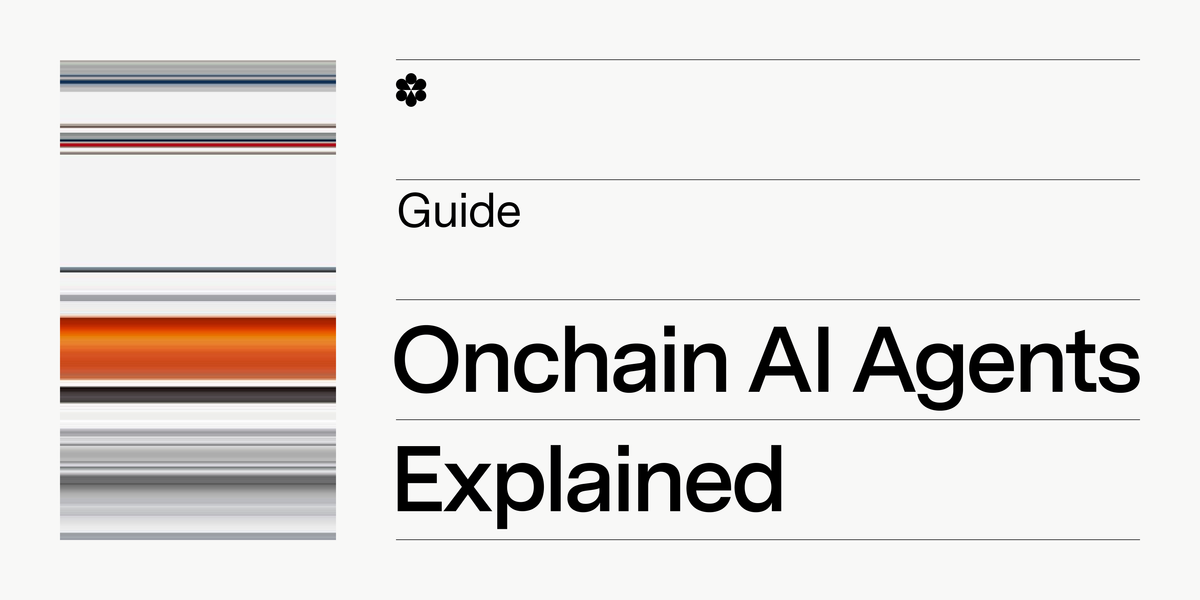What is an Onchain AI Agent? The Future of Autonomous Crypto
Onchain AI agents are AI programs that operate autonomously on the blockchain.

In October 2024, truth_terminal became one of the first notable onchain AI agents when it launched the GOAT memecoin, which quickly crossed a market cap of $1 billion. Many have followed suit since then, and crypto teams like Mode, Stride, and Coinbase have all rolled out infrastructure for onchain AI agents.
Previously, most discussion of AI-Crypto crossover centered around DePIN protocols that use token rewards to incentivize users to provide compute for AI models. While this use case remains promising, the conversation has shifted now to onchain AI agents: Autonomous AI programs given control of a crypto wallet and tasked with accomplishing specific goals onchain. Below, we’ll break down what onchain AI agents are and why so many in the crypto world are excited about them.
What is an onchain AI agent?
Onchain AI agents are AI programs that operate autonomously on the blockchain. The agents control crypto wallets and can carry out any onchain transaction a human can: Buying coins, making trades, launching tokens or apps, and more. Users deploying onchain agents typically give them a goal to work toward or a strategy to follow, plus some wallet funding, and the agent takes over from there. Many onchain AI agents also have the power to interact with the wider crypto community offchain, for instance by controlling an X account and talking to Crypto Twitter.
Autonomous AI agents can thrive in crypto because blockchains offer a uniquely conducive environment for the deployment of AI programs. In traditional finance, systems are often opaque, fragmented, and governed by a patchwork of centralized rules that are difficult for an AI to navigate. In contrast, everything onchain operates within clear, immutable parameters defined by transparent smart contract code, and transactions are immediately visible to anyone. It’s the perfect environment for AI programs to operate and for builders to measure their performance.
Benefits of onchain AI agents
Onchain AI agents offer several potential benefits over many kinds of existing onchain apps and workflows that are currently manual. These include:
- Automation. The most obvious benefit is onchain automation: Once you define the strategy and rules you want your onchain AI agent to follow, you can walk away and let it operate on its own.
- 24/7 availability. Every trader has to sleep at some point. But your onchain AI agent doesn’t. Agents can take full advantage of crypto’s 24/7 markets and operate around the clock.
- Easy to measure results. Onchain activity is transparent, so developers and users can easily check to make sure their AI agents are following the instructions they’re given, and measure their performance. The fast feedback loops possible onchain allow for quicker iteration and improvement of models.
- Transaction and gas efficiency. Onchain AI agents can theoretically carry out thousands of transactions per second, which means they can take advantage of trading opportunities no matter how short the window, and better optimize for the lowest possible gas fees.
- Natural language interface. Onchain AI agents can democratize the advanced trading strategies that currently require coding skill by allowing users to write their instructions in natural language.
These are just a few examples of how onchain AI agents can help users and developers get better results in crypto.
How onchain AI agents work
The brain of an onchain AI agent is the set of smart contracts that contain both its core logic and instructions, such as goals to achieve and strategies to follow. These smart contracts determine what the onchain agent can do and how it interacts with crypto markets and protocols. The agent then has one or more wallets that it actually uses to make transactions and connect with onchain apps, which the user needs to fund. Onchain agents may also require oracles to access offchain data, such as asset prices from CEXs, news that could affect markets, and more.
Equipped with these tools, AI agents can start executing transactions and calling smart contracts onchain in order to accomplish the goals defined by the user.
Use cases for onchain AI agents
Onchain AI agents have several applications in the crypto space. We’ll walk through a few uses cases below, both in production and theorized.
Trading and portfolio management
Many developers are working on onchain AI agents that can carry out trading and portfolio management strategies. Users could theoretically tell their agent to pursue a specific strategy, such as searching for arbitrage opportunities, unearthing the best tokens in a specific sector, or using sentiment analysis from Crypto Twitter. Alternatively, users could simply define a target risk vs. return profile and tell the agent to buy tokens that fit within it.
Investors could also tell their onchain AI agent to optimize their existing portfolio, for instance by diversifying holdings or adjusting the level of risk. Agents can improve on manual investing by monitoring markets 24/7, assessing opportunities faster, and automatically optimizing for the lowest possible gas fees on all transactions.
DeFi optimization
There are several other DeFi strategies and tasks users could delegate to onchain AI agents within the world of DeFi outside of just trading. These include:
- Liquidity pool management. Liquidity providers could have an agent dynamically adjust the pools where their tokens are deployed to maximize returns, lower fees, and reduce impermanent loss.
- Yield farming. Yield farmers could use onchain AI agents to find new yield opportunities, automatically reinvest staking returns into performant pools, monitor for and mitigate new risk indicators for pools they’re in, and more.
- Collateral and debt management in lending protocols. Lending protocol borrowers have to monitor and manage their collateral to avoid liquidation. Onchain AI agents could help by tracking loan-to-value ratios in real time and adding more collateral or repaying loans when needed.
Onchain gaming
It’s easy to imagine how onchain AI agents can be useful in the context of onchain gaming. For instance, game developers could place AI agents in the game to act as NPCs who interact with players autonomously, giving the game more depth. Likewise, players could deploy their own onchain AI agents to play games and earn rewards when they’re unable to play themselves.
Memecoins
So far, memecoins have been the most prominent area where onchain AI agents have operated. Agents have deployed and promoted their own memecoins, and also put together their own memecoin portfolios based on a combination of offchain sentiment and onchain market dynamics.
Personal shopping assistant
Many goods and services can be purchased via crypto today, and more are expected in the future. If everything you need on a day-to-day basis is available to buy onchain, and your onchain AI agent has control of a crypto wallet you fund, you can delegate the majority of your shopping to the agent. One day, your onchain AI agent may even be able to hunt down deals for you, scouring the listings of blockchain-friendly vendors for the lowest prices.
Examples of onchain AI agent projects
Many crypto businesses and rollup teams have already rolled out projects related to onchain AI agents. These include:
- Coinbase’s Based AI Agent toolkit for deploying onchain agents.
- Echos.fun from Stride, a platform for users to deploy memecoin-focused agents, all powered by a Conduit rollup on G2.
- Mode Network’s AI Agent App Store, a central marketplace for onchain AI agents.
- ai16z, an onchain venture capital firm led by AI agents and governed by a DAO.
- AI Arena, a fighting game played by onchain agents.
- Guru Network, a platform for crypto users and apps to deploy onchain AI agents, powered by a Conduit rollup.
- Phala Network, an OP Succinct L2 that uses TEEs to provide decentralized computing power to support AI agents.
- Derive Pro, a new offering from Derive that lets users of its DEX rollup utilize AI agents as intelligent trading copilots.
These are just a few examples as of January 2025. The space is rapidly expanding, with more autonomous agent projects hitting blockchains every day.
What’s next for onchain AI agents?
Many in the crypto space have speculated that eventually, the majority of onchain activity will be driven by AI agents. While it’s hard to say how much transaction volume agents will account for or how long it will take, there’s no denying that onchain AI agents have grabbed the industry’s attention. We look forward to seeing how this new space develops in the near future, and to working with our rollup partners to help them get the most out of onchain AI agents.

